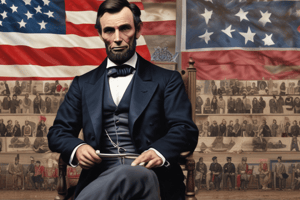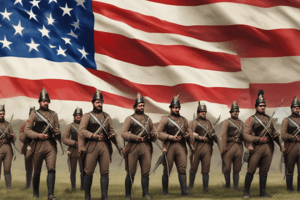Podcast
Questions and Answers
What was the first battle of the Civil War?
What was the first battle of the Civil War?
- Battle of Bull Run
- Battle of Gettysburg
- Battle of Antietam
- Fort Sumter (correct)
Which state was the first to secede from the Union?
Which state was the first to secede from the Union?
- Georgia
- South Carolina (correct)
- Texas
- Virginia
What was one of the main strategies of the Union's Anaconda Plan?
What was one of the main strategies of the Union's Anaconda Plan?
- Establish a naval blockade (correct)
- Capture Richmond
- Directly invade the North
- Form alliances with European countries
Why did the South believe they could win the Civil War?
Why did the South believe they could win the Civil War?
What action did Lincoln take to gather support for the Union?
What action did Lincoln take to gather support for the Union?
Who became famous for their performance at the Battle of Bull Run?
Who became famous for their performance at the Battle of Bull Run?
What was one consequence of the First Battle of Bull Run?
What was one consequence of the First Battle of Bull Run?
Which of the following statements about Andrew McClellan is true?
Which of the following statements about Andrew McClellan is true?
What was a significant consequence of the Black Codes enacted by Southern states?
What was a significant consequence of the Black Codes enacted by Southern states?
Which amendment granted African American citizenship?
Which amendment granted African American citizenship?
What was the primary goal of the Ku Klux Klan during the Reconstruction period?
What was the primary goal of the Ku Klux Klan during the Reconstruction period?
What event led to the end of significant protections for African Americans after Reconstruction?
What event led to the end of significant protections for African Americans after Reconstruction?
How did Andrew Johnson's plan impact former Confederates?
How did Andrew Johnson's plan impact former Confederates?
What was a notable advancement for African Americans during the Reconstruction period?
What was a notable advancement for African Americans during the Reconstruction period?
What was the outcome of the political resistance against Reconstruction efforts?
What was the outcome of the political resistance against Reconstruction efforts?
Which of the following describes one of the challenges faced during Reconstruction?
Which of the following describes one of the challenges faced during Reconstruction?
What was the main strategy that Grant employed during the Siege of Vicksburg?
What was the main strategy that Grant employed during the Siege of Vicksburg?
What significant event did the Emancipation Proclamation aim to achieve?
What significant event did the Emancipation Proclamation aim to achieve?
Which battle is known as the bloodiest single day in American history?
Which battle is known as the bloodiest single day in American history?
During the Battle of Gettysburg, what was a major mistake made by General Lee?
During the Battle of Gettysburg, what was a major mistake made by General Lee?
What did the Siege of Petersburg primarily aim to achieve?
What did the Siege of Petersburg primarily aim to achieve?
What is the significance of Sherman's March to the Sea?
What is the significance of Sherman's March to the Sea?
What was the outcome of Lincoln's second election?
What was the outcome of Lincoln's second election?
Why did General Lee invade the North?
Why did General Lee invade the North?
Which event marked the last major Confederate offensive of the Civil War?
Which event marked the last major Confederate offensive of the Civil War?
What was a major consequence of the assassination of Lincoln?
What was a major consequence of the assassination of Lincoln?
What was a significant reason for the Union's advantages during the Civil War?
What was a significant reason for the Union's advantages during the Civil War?
How did Grant's leadership style contribute to his reputation?
How did Grant's leadership style contribute to his reputation?
What was the primary aim of the Reconstruction Era?
What was the primary aim of the Reconstruction Era?
Flashcards
Southern Confidence
Southern Confidence
The Confederate States of America believed they could secure aid from Britain due to their control of 60% of the cotton supply used in British textile production. This belief, coupled with their perceived military superiority and assumption of Northern apathy, fueled their confidence in a Southern victory.
Fort Sumter
Fort Sumter
The first shots of the Civil War were fired at Fort Sumter, South Carolina, despite both Lincoln and Davis's initial desire to avoid war. This event marked the beginning of the conflict, leading to the secession of the South and the establishment of two distinct nations within the United States.
Battle of Bull Run
Battle of Bull Run
The Battle of Bull Run, also known as the First Battle of Manassas, was a significant early battle of the Civil War. It was a Confederate victory, showcasing the strength of their army and exposing the Union's unpreparedness. The defeat led to the appointment of General George McClellan as commander of the Army of the Potomac and solidified Stonewall Jackson's military reputation.
Robert E. Lee's Choice
Robert E. Lee's Choice
Signup and view all the flashcards
The Anaconda Plan
The Anaconda Plan
Signup and view all the flashcards
Lincoln's Response to Secession
Lincoln's Response to Secession
Signup and view all the flashcards
Lincoln's Decision to Send Ships
Lincoln's Decision to Send Ships
Signup and view all the flashcards
Southern Secession
Southern Secession
Signup and view all the flashcards
Reconstruction
Reconstruction
Signup and view all the flashcards
13th Amendment
13th Amendment
Signup and view all the flashcards
14th Amendment
14th Amendment
Signup and view all the flashcards
15th Amendment
15th Amendment
Signup and view all the flashcards
Black Codes
Black Codes
Signup and view all the flashcards
Ku Klux Klan (KKK)
Ku Klux Klan (KKK)
Signup and view all the flashcards
Jim Crow
Jim Crow
Signup and view all the flashcards
1876 Election
1876 Election
Signup and view all the flashcards
Battle of Antietam
Battle of Antietam
Signup and view all the flashcards
Emancipation Proclamation
Emancipation Proclamation
Signup and view all the flashcards
Battle of Fredericksburg
Battle of Fredericksburg
Signup and view all the flashcards
Battle of Gettysburg
Battle of Gettysburg
Signup and view all the flashcards
Siege of Vicksburg
Siege of Vicksburg
Signup and view all the flashcards
Gettysburg Address
Gettysburg Address
Signup and view all the flashcards
Appointment of Grant
Appointment of Grant
Signup and view all the flashcards
Lincoln's Second Election
Lincoln's Second Election
Signup and view all the flashcards
Siege of Petersburg
Siege of Petersburg
Signup and view all the flashcards
Sherman's March to the Sea
Sherman's March to the Sea
Signup and view all the flashcards
Lee surrenders to Grant
Lee surrenders to Grant
Signup and view all the flashcards
Reconstruction Era
Reconstruction Era
Signup and view all the flashcards
The KKK
The KKK
Signup and view all the flashcards
Lincoln's 2nd Inaugural Address
Lincoln's 2nd Inaugural Address
Signup and view all the flashcards
Study Notes
Civil War Overview
- Flag: The Confederate battle flag was a cross flag, featuring one star and one south.
- Election: Lincoln wasn't on some Southern ballots. South Carolina was the first state to leave the Union. Two countries formed within America, each claiming to be "America". They created new constitutions protecting slavery.
- War: The capitals of the North and South were geographically close. Over 620,000 Americans died, and 3.9 million slaves were freed.
- Fort Sumter: The first shots were fired at Fort Sumter, though neither Lincoln nor Davis wanted war. Lincoln hesitated to send ships, but eventually sent them. Confederates bombarded the fort for days until surrender.
South's Reasoning for War
- Victory belief: The South thought it could win, believing Britain would support them due to dependence on Southern cotton (60%).
- Northern disinterest: A belief that the North didn't care enough.
- Military superiority: A perceived military advantage.
Lincoln's Response
- Call for volunteers: Lincoln called for 75,000 volunteers.
- Suspension of Habeas Corpus: Lincoln suspended habeas corpus, allowing commanders to arrest those threatening military operations. This action wasn't approved by Congress.
- Naval blockade: Lincoln announced a naval blockade of the South.
Union Strategy (Anaconda Plan)
- Naval Blockade: A naval blockade of the Southern ports.
- Split the South: To split the South in two by controlling the Mississippi River.
- Invade Richmond: Then invade Richmond, the Southern capital.
Key Battles
- Battle of Bull Run (First Manassas): A Confederate victory, pushing the Union back. Led to the hiring of George McClellan as commander of the Army of the Potomac. The battle was watched by picnickers.
- Seven Days’ Battle: McClellan's attempt to capture Richmond was beaten by Lee.
- Battle of Shiloh: A bloody Union victory led by Ulysses S. Grant, who demanded unconditional surrender.
- Battle of Antietam: A decisive Union victory, the bloodiest day in American history, with 23,000 dead. Lee's invasion of the North was stopped due to the Union gaining Lee's plans. McClellan was replaced by General Burnside after this.
- Battle of Fredericksburg: A Confederate victory; Burnside was replaced by Hooker after huge Union losses.
- Battle of Gettysburg: A turning point, a 3-day war resulting in a Union victory. Lee's invasion of the North failed. Pickett's Charge was a disastrous frontal assault that resulted in significant Confederate casualties. Lee fled after the battle.
- Siege of Vicksburg: Grant's siege of Vicksburg was crucial to controlling the Mississippi. After 6 weeks, Pemberton surrendered.
Emancipation Proclamation
- War about slavery: Lincoln made the war about slavery, hoping to prevent Britain from siding with the South.
- Victory condition: Done after a Union victory to show the North's war-winning capability.
- Border states exemption: Exempted border states that remained in the Union.
Grant's Role
- General-in-Chief: Lincoln appointed Grant as general-in-chief of the Union forces. Grant was known for his aggressive tactics.
- Richmond and Petersburg: Grant aimed to capture Richmond and Petersburg, critical supply centers, via attrition tactics.
- Sherman’s March to the Sea: Sherman's destructive march from Atlanta to Savannah, with total destruction of about $100 million.
Lincoln's Second Election
- McClellan as opponent: Lincoln ran against McClellan.
- Andrew Johnson as VP: Johnson was Lincoln's vice-presidential pick from the South, loyal to the Union.
- Atlanta's fall: The fall of Atlanta was a decisive victory for the Union.
Lee Surrenders
- Abandonment of Richmond: Lee abandoning Richmond, ultimately surrendering to Grant.
- End of War: A major tragedy ending slavery and requiring the rebuilding of the South.
Reconstruction Era
- Rebuilding America: Reconstruction (rebuilding America) following the war; uncertain for African Americans. Known as the "Second Civil War" because of the violence.
- Goals: Rebuild the South, integrate Southern states into the Union, and ensure they followed new laws.
- Challenges: Physical destruction, integrating newfound citizens, political resistance, economic disruption, and social divisions.
- Constitutional Amendments: 13th (ended slavery), 14th (citizenship), and 15th (voting rights).
- Reconstruction Policies: Lincoln's lenient approach, the Radical Republicans' stricter policies.
- Johnson's Plan: Johnson's plan favored ex-Confederates.
Johnson's Impeachment
- Johnson's actions: Johnson's actions led to impeachment proceedings.
- Acquittal: Johnson was acquitted.
Post-War Advancements
- Blacks in office: African Americans could hold public office.
- Education and legal rights: Public education and legal recognition for African Americans and their families.
- Black universities: New Black universities.
1876 Election
- Deadlocked election: A highly contested election. A major political deal, "Corrupt Bargain"
- End of Reconstruction: Compromises resulted in the end of Reconstruction in the South, leading to Jim Crow laws.
Failures of Reconstruction
- Jim Crow laws: Jim Crow laws segregated and discriminated against African Americans.
Lincoln's Assassination
- John Wilkes Booth: Assassinated by John Wilkes Booth.
Other Important Info
- Railroads and Telegraphs: Railroads and telegraphs greatly aided the North in the war.
Studying That Suits You
Use AI to generate personalized quizzes and flashcards to suit your learning preferences.




